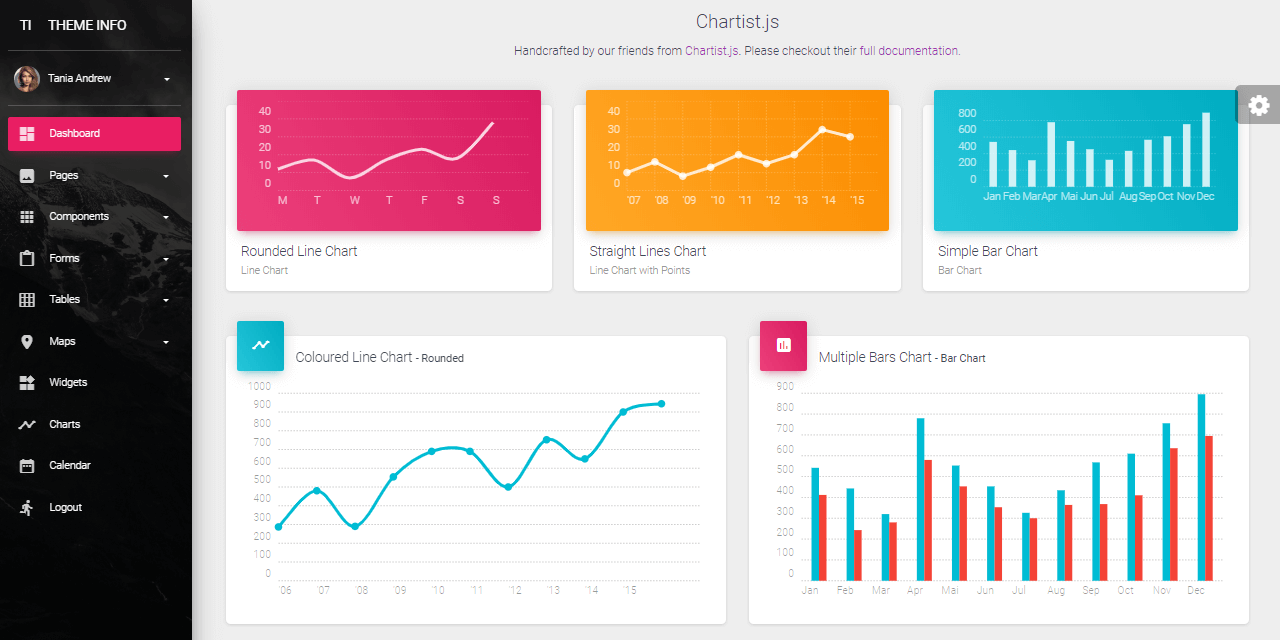https://github.com/app-generator/jinja-material-dashboard-pro
Jinja Template - Material Dashboard PRO | AppSeed
https://github.com/app-generator/jinja-material-dashboard-pro
appseed jinja-template material-dashboard
Last synced: about 2 months ago
JSON representation
Jinja Template - Material Dashboard PRO | AppSeed
- Host: GitHub
- URL: https://github.com/app-generator/jinja-material-dashboard-pro
- Owner: app-generator
- License: other
- Created: 2020-06-10T13:09:16.000Z (almost 5 years ago)
- Default Branch: master
- Last Pushed: 2021-11-01T09:56:15.000Z (over 3 years ago)
- Last Synced: 2025-04-06T18:13:31.995Z (about 2 months ago)
- Topics: appseed, jinja-template, material-dashboard
- Homepage: https://appseed.us/jinja-template
- Size: 2.71 MB
- Stars: 1
- Watchers: 2
- Forks: 0
- Open Issues: 0
-
Metadata Files:
- Readme: README.md
- Changelog: CHANGELOG.md
- License: LICENSE.md
Awesome Lists containing this project
README
# [Jinja Template](https://appseed.us/jinja-template) Material Dashboard PRO
> Template Theme provided by [AppSeed](https://appseed.us) - Features:
- Up-to-date [dependencies](./requirements.txt): **Flask 2.0.1**
- [SCSS compilation](#recompile-css) via **Gulp**
- UI Kit: **Material Kit PRO** by **Creative-Tim**
- Render Engine: Flask / [Jinja2](https://jinja.palletsprojects.com/)
- **Commercial License**: [Personal](https://github.com/app-generator/license-personal) / [Developer](https://github.com/app-generator/license-developer)
- 24/7 Live Support via [Discord](https://discord.gg/fZC6hup).
> Links
- [Jinja Material Dashboard PRO - DEMO](https://jinja-material-dashboard-pro.appseed-srv1.com) - starter in action
- More [Jinja Templates](https://appseed.us/jinja-template) provided by AppSeed
## Material Dashboard PRO
Material Dashboard PRO is a Premium Material Bootstrap 4 Admin with a fresh, new design inspired by Google's Material Design.
It is based on the popular Bootstrap 4 framework and comes packed with multiple third-party plugins.
All components are built to fit perfectly with each other while aligning to the material concepts.
> Links
- [Material Dashboard PRO](https://www.creative-tim.com/product/material-dashboard-pro/?AFFILIATE=128200) - product page
- [Material Dashboard PRO Docs](https://demos.creative-tim.com/material-dashboard-pro/docs/2.1/getting-started/introduction.html)

## Build from sources
```bash
$ # Clone the sources
$ git clone https://github.com/app-generator/priv-jinja-material-dashboard-pro.git
$ cd priv-jinja-material-dashboard-pro
$
$ # Virtualenv modules installation (Unix based systems)
$ virtualenv env
$ source env/bin/activate
$
$ # Virtualenv modules installation (Windows based systems)
$ # virtualenv env
$ # .\env\Scripts\activate
$
$ # Install requirements
$ pip3 install -r requirements.txt
$
$ # Set the FLASK_APP environment variable
$ (Unix/Mac) export FLASK_APP=run.py
$ (Windows) set FLASK_APP=run.py
$ (Powershell) $env:FLASK_APP = ".\run.py"
$
$ # Set up the DEBUG environment
$ # (Unix/Mac) export FLASK_ENV=development
$ # (Windows) set FLASK_ENV=development
$ # (Powershell) $env:FLASK_ENV = "development"
$
$ # Run the Jinja Template
$ # --host=0.0.0.0 - expose the app on all network interfaces (default 127.0.0.1)
$ # --port=5000 - specify the app port (default 5000)
$ flask run --host=0.0.0.0 --port=5000
$
$ # Access the UI in browser: http://127.0.0.1:5000/
```
## Code-base structure
The project has a simple structure, represented as bellow:
```bash
< PROJECT ROOT >
|
|-- app/
| |-- static/
| | |-- # CSS files, Javascripts files
| |
| |-- templates/
| | |
| | |-- includes/ # Page chunks, components
| | | |
| | | |-- navigation.html # Top bar
| | | |-- sidebar.html # Left sidebar
| | | |-- scripts.html # JS scripts common to all pages
| | | |-- footer.html # The common footer
| | |
| | |-- layouts/ # App Layouts (the master pages)
| | | |
| | | |-- base.html # Used by common pages like index, UI
| | | |-- base-fullscreen.html # Used by auth pages (login, register)
| | |
| | |-- accounts/ # Auth Pages (login, register)
| | | |
| | | |-- login.html # Use layout `base-fullscreen.html`
| | | |-- register.html # Use layout `base-fullscreen.html`
| | |
| | |-- home/ # UI Kit Pages
| | |-- index.html # Index page
| | |-- 404-page.html # 404 page
| | |-- *.html # All other pages
| |
| views.py # Application Routes
|
|-- Dockerfile # Deployment
|-- docker-compose.yml # Deployment
|-- gunicorn-cfg.py # Deployment
|-- nginx # Deployment
| |-- appseed-app.conf # Deployment
|
|-- requirements.txt
|-- run.py
|
|-- ************************************************************************
```
## Recompile CSS
To recompile SCSS files, follow this setup:
**Step #1** - Install tools
- [NodeJS](https://nodejs.org/en/) 12.x or higher
- [Gulp](https://gulpjs.com/) - globally
- `npm install -g gulp-cli`
- [Yarn](https://yarnpkg.com/) (optional)
**Step #2** - Change the working directory to `assets` folder
```bash
$ cd app/static/assets
```
**Step #3** - Install modules (this will create a classic `node_modules` directory)
```bash
$ npm install
// OR
$ yarn
```
**Step #4** - Edit & Recompile SCSS files
```bash
$ gulp scss
```
The generated file is saved in `static/assets/css` directory.
## Deployment
The project comes with a basic configuration for [Docker](https://www.docker.com/), [Gunicorn](https://gunicorn.org/), and [Waitress](https://docs.pylonsproject.org/projects/waitress/en/stable/).
### [Docker](https://www.docker.com/) execution
---
The steps to start the template using Docker:
> Get the code
```bash
$ git clone https://github.com/app-generator/priv-jinja-material-dashboard-pro.git
$ cd priv-jinja-material-dashboard-pro
```
> Start the app in Docker
```bash
$ sudo docker-compose pull && sudo docker-compose build && sudo docker-compose up -d
```
Visit `http://localhost:5005` in your browser. The app should be up & running.
### [Gunicorn](https://gunicorn.org/)
---
Gunicorn 'Green Unicorn' is a Python WSGI HTTP Server for UNIX.
> Install using pip
```bash
$ pip install gunicorn
```
> Start the app using gunicorn binary
```bash
$ gunicorn --bind 0.0.0.0:8001 run:app
Serving on http://localhost:8001
```
Visit `http://localhost:8001` in your browser. The app should be up & running.
### [Waitress](https://docs.pylonsproject.org/projects/waitress/en/stable/)
---
Waitress (Gunicorn equivalent for Windows) is meant to be a production-quality pure-Python WSGI server with very acceptable performance. It has no dependencies except ones that live in the Python standard library.
> Install using pip
```bash
$ pip install waitress
```
> Start the app using [waitress-serve](https://docs.pylonsproject.org/projects/waitress/en/stable/runner.html)
```bash
$ waitress-serve --port=8001 run:app
Serving on http://localhost:8001
```
Visit `http://localhost:8001` in your browser. The app should be up & running.
## Credits & Links
- [Flask Framework](https://www.palletsprojects.com/p/flask/) - The official website
---
[Jinja Template](https://appseed.us/jinja-template) Material Dashboard PRO - Provided by **AppSeed** [App Generator](https://appseed.us/app-generator).